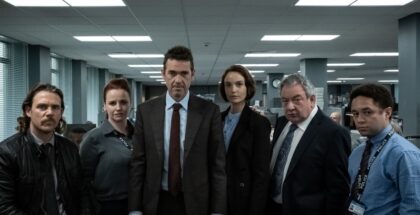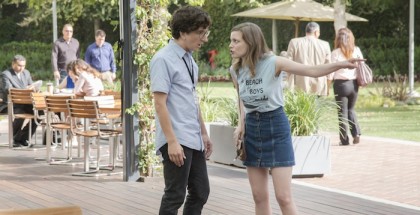True Crime Tuesdays: Tell Them You Love Me
Review Overview
Understatement
9Sensitivity
9Interviews
9Helen Archer | On 16, Jul 2024
When John Johnson met Anna Stubblefield in 2009, he was hopeful she could help him with his brother. A PhD student at Rutgers University, where Stubblefield was the chair of the philosophy department, Johnson attended a lecture on “facilitated communication”, a technique that promised to unlock the potential of people who, through a variety of disabilities, were non-vocal. John’s brother, Derrick – then aged 30 – suffered from cerebral palsy and was deemed by the medical establishment at the time to be “mentally retarded”. Stubblefield agreed to meet with him and assess his suitability for the treatment.
It was the beginning of a years-long nightmare for the Johnson family, as Stubblefield inserted herself into Derrick’s life in ever-more disturbing ways. This documentary, directed by Nick August-Perna for Louis Theroux’s production company, tells the story through interviews with the main actors, including John, his mother, Daisy, and Stubblefield herself. All participate, except Derrick, who, quite simply, cannot – which is the crux of the matter.
The film spends some time explaining the concept of facilitated communication – a method that involves using a pad to type out the subjects’ thoughts but, crucially, with the help of an assistant who steadies their hand and guides them towards each word. By the end of the documentary, we find out that this is a contentious technique, which has been discredited by many professional bodies. Questions have been asked, specifically, about the facilitator imposing their own thoughts on the person they are facilitating. For John and his mother Daisy, though, it was a godsend – a hope that it could unlock a side of Derrick which had thus far been suppressed.
Derrick seemed to flourish, as, with Stubblefield’s help, he communicated his thoughts on books, social issues and philosophy. Yet as time went on, the Johnsons began to question just how much of Derrick’s inner thoughts were being expressed. Racial issues were also at play – Stubblefield is white, while the Johnsons are Black – and Daisy began to notice the way in which Stubblefield talked down to her, changing her gospel music to classical and claiming that Derrick had acquired a taste for red wine. Then Stubblefield claimed she and Derrick were in love and had begun a physically intimate relationship. John contacted law enforcement, after noticing wounds on Derrick’s back while he was changing his diaper – wounds which Stubblefield conceded were caused after a sexual encounter in her office.
Perhaps the most disturbing aspect of this documentary – which gets more disturbing as it goes on, as small details are dropped, and as the Johnsons’ anger becomes more clear – is Stubblefield’s continued insistence that she did nothing wrong. Eyes shining beatifically with a fanaticism that is tempting to diagnose – her ex-husband, in a victim impact statement to the court she ended up in, calls her a “narcissist” – she insists, still, that she and Derrick were in love, and exploring a consensual relationship. She is backed by her mother, who worked with children with disabilities – who describes Anna as the most compassionate person she knows, and who recalls her feigning disability as a child in order to better understand the patients her mother treated.
The filmmakers never stand in judgement; they merely allow the story to be told, and for viewers to make up their own minds. Though this could prove frustrating to those used to more didactic approaches, it is apt for a documentary that covers complicated questions of white saviourism, disability and the nature of consent. While Stubblefield is initially presented as an “expert”, she becomes increasingly a Humbert Humbert-like figure as her own words betray her, as she attempts to justify her actions by both intellectualising and romanticising the relationship. It is a documentary which stays with you far beyond the closing credits, as the long-term impact for Derrick and his family are gradually pulled into sharp focus.





















